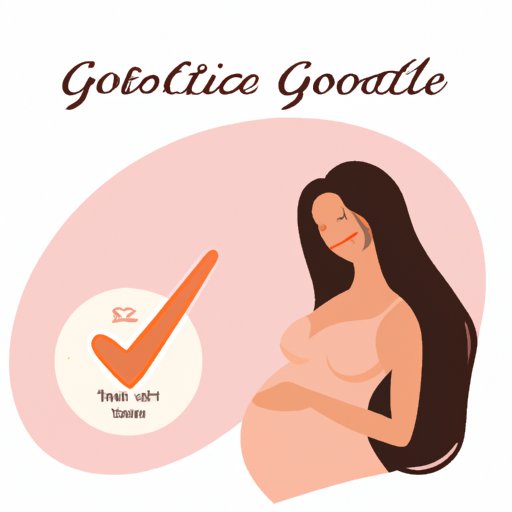
I. Introduction
A miscarriage is a difficult and emotional experience for any woman and her partner. After a miscarriage, many women wonder whether they can conceive again and how long they should wait before trying. This guide is intended for women who have experienced a miscarriage and are considering trying again.
It provides scientific information on topics such as fertility, ovulation, conception factors, and timing, and it also offers support and advice based on the personal experiences of women who have gone through a miscarriage and successfully conceived again.
II. Explaining the Biology
The menstrual cycle is the regular process that the female body goes through to prepare for pregnancy. It consists of four different phases: the follicular phase, ovulation, the luteal phase, and menstruation. Ovulation is the release of an egg from one of the ovaries, which can occur about 14 days after the first day of a woman’s period.
A miscarriage can affect fertility, as it can cause hormonal imbalances that affect ovulation and implantation. Tracking ovulation is important for women trying to conceive after a miscarriage, and can be done through methods such as measuring basal body temperature and observing cervical mucus changes.
III. Timing
It’s important to wait before trying again after a miscarriage to give your body time to heal physically and emotionally. Women are often advised to wait a few months before trying again, but this can vary depending on a woman’s health and the circumstances surrounding the miscarriage. Factors such as age, pre-existing conditions, and previous pregnancies or miscarriages can also impact fertility.
It’s essential to ensure your body is healed and healthy enough to conceive again before trying. This can be done through regular visits to a doctor, monitoring ovulation, and taking steps to boost fertility, such as eating a healthy diet and taking prenatal vitamins.
IV. Factors That Influence Conception
Age is a critical factor that affects fertility. Women are born with a finite number of eggs that diminish over time, with fertility starting to decline after the age of 35.
Pre-existing conditions such as polycystic ovary syndrome (PCOS) and endometriosis can also impact fertility. A history of previous pregnancies or miscarriages may increase the risk of complications in future pregnancies, although steps can be taken to minimize the risk of these complications.
To boost fertility, women can take specific steps such as maintaining a healthy weight, reducing stress, quitting smoking, and reducing alcohol and caffeine intake.
V. Myth Busting
A common myth about conceiving after a miscarriage is that women cannot get pregnant immediately after a miscarriage. However, this is not true. Ovulation can resume as little as two weeks after a miscarriage, meaning that women can conceive again quickly.
Other myths surrounding conception after a miscarriage include the idea that a D&C procedure can prevent future pregnancies and that it’s easy to conceive after a miscarriage. These are not true, and seeking medical advice and follow-up care is essential for a successful pregnancy after a miscarriage.
VI. Sharing Personal Experiences
While every woman’s experience of miscarriage is different, sharing personal stories of women who have gone through a miscarriage can help others feel understood and less alone. Many women share how they overcame their feelings of loss and fear and successfully conceived again, bringing hope to those who may be going through a similar experience.
VII. Providing Support
Support groups and resources are an essential component in helping women who have gone through a miscarriage. These groups offer emotional support, information, and help women form connections with others who have experienced a similar loss. Experts in the field of reproductive health can also provide medical support and advice.
Success stories can inspire and motivate women, showcasing that successful pregnancies after a miscarriage are possible.
VIII. Offering Tips
For women trying to conceive after a miscarriage, eating healthily and taking prenatal vitamins are essential. Regular visits to a doctor and monitoring ovulation can also help boost fertility and promote a healthy pregnancy. Reducing stress and getting enough sleep can also improve fertility.
IX. Conclusion
Trying to conceive after a miscarriage can be a difficult experience, both physically and emotionally. However, with support, guidance, and the right mindset, women can successfully conceive and deliver healthy babies after a miscarriage.
This guide has highlighted the biology behind conception, the reasons to wait before trying again, the factors that influence conception, and how to boost fertility. To achieve a successful pregnancy after a miscarriage, it’s essential to seek the help and support needed and take care of your body and mind throughout the process.
Additional resources and support for women trying to conceive after a miscarriage can be found through various online groups and reputable health institutions. Remember, always seek the advice of medical professionals when making decisions regarding your fertility and pregnancy.





